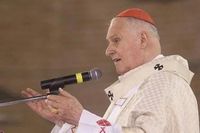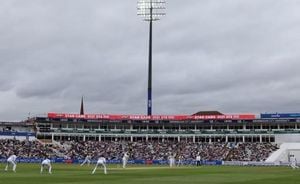As the Vatican prepares for its latest conclave, the presence of seven Brazilian cardinals among the 133 electors has reignited interest in the historical moment when a Brazilian was nearly elected Pope. In 1978, Cardinal Dom Aloísio Lorscheider, then Archbishop of Fortaleza, became the first to receive the two-thirds majority required to ascend to the papacy. However, in a surprising turn of events, he declined the position due to serious health concerns.
Dom Aloísio's refusal is a poignant chapter in the history of the Catholic Church, especially considering that Brazil has never had a pope. His decision came in the wake of the sudden death of Pope John Paul I, who served for only 33 days. Dom Aloísio, who had undergone heart surgery and had eight bypasses, feared the possibility of facing similar health issues if elected.
Frei Betto, a noted Brazilian writer and educator, recently revisited this episode in an article on his blog, highlighting the gravity of Dom Aloísio's choice. He noted that the cardinal was not only concerned about his own health but also about the potential crisis that could arise for the Church should he have to step down prematurely.
In the 1978 conclave, after Dom Aloísio received the requisite votes, he was consulted about accepting the role of pope. He expressed his inability to take on such a significant responsibility, citing his health problems. His refusal led to the election of Cardinal Karol Wojtyła, who became Pope John Paul II and would go on to lead the Church for 26 years until his death in 2005.
According to the biography "Papa João Paulo II – A Biografia" by American journalist Tad Szulc, the conclave faced a deadlock before Dom Aloísio took action behind the scenes. He worked diligently to mobilize support for Wojtyła, particularly among Latin American and African cardinals, ultimately helping to break the stalemate and secure Wojtyła's election.
Dom Aloísio Lorscheider passed away on December 23, 2007, in Porto Alegre, at the age of 83, following complications from multiple organ failure after nearly a month in the hospital. His legacy as a prominent figure in the Church, particularly in Latin America, is well remembered. Born in Estrela, Rio Grande do Sul, he was the grandson of German immigrants and became a significant leader within the Catholic community.
Beyond his role as Archbishop of Fortaleza, he also served as the Archbishop of Aparecida and held the presidency of the National Conference of Bishops of Brazil (CNBB) and the Latin American Episcopal Council (CELAM). In 1976, he was elevated to cardinal by Pope Paul VI, marking a significant moment in his ecclesiastical career.
The story of Dom Aloísio's near-election remains a powerful reminder of how close Brazil came to having its first pope. As the current conclave unfolds, the possibility of a Brazilian pope is again a topic of discussion. Among the seven Brazilian cardinals participating this year are Dom Odilo Scherer, Archbishop of São Paulo; Dom Orani Tempesta, Archbishop of Rio de Janeiro; and Dom Sergio da Rocha, Archbishop of Salvador and primate of Brazil.
As the conclave commenced on May 7, 2025, the eyes of the world turned toward the Vatican, where the cardinals gathered in the Sistine Chapel. On the morning of May 8, black smoke rose from the chapel, indicating that no pope had yet been elected. The anticipation surrounding the selection of the new pope is palpable, with many speculating on who might emerge as the next leader of the Catholic Church.
Dom Sergio da Rocha, a cardinal since 2016 and a member of the C9 advisory group to Pope Francis, has been mentioned as a potential candidate by the French press. When asked about the prospect of a Brazilian becoming pope, he refrained from making predictions, stating, "At this moment, we don’t have much to say about the conclave; we have what to say about Pope Francis. The conclave is in God’s hands. Surely, the Holy Spirit will guide the electing cardinals to help us make the decision that God wants for the Church."
This sentiment echoes the historical weight of the conclave and the significance of the choice that lies ahead. As the cardinals deliberate, they carry with them the hopes and prayers of millions of Catholics around the world.
Reflecting on the past, the story of Dom Aloísio Lorscheider serves as a reminder that the path to the papacy can be fraught with personal sacrifice and difficult choices. His legacy continues to influence the narrative of the Church in Brazil and Latin America, as the world watches to see who will be chosen to lead the Catholic faithful in this new chapter.






